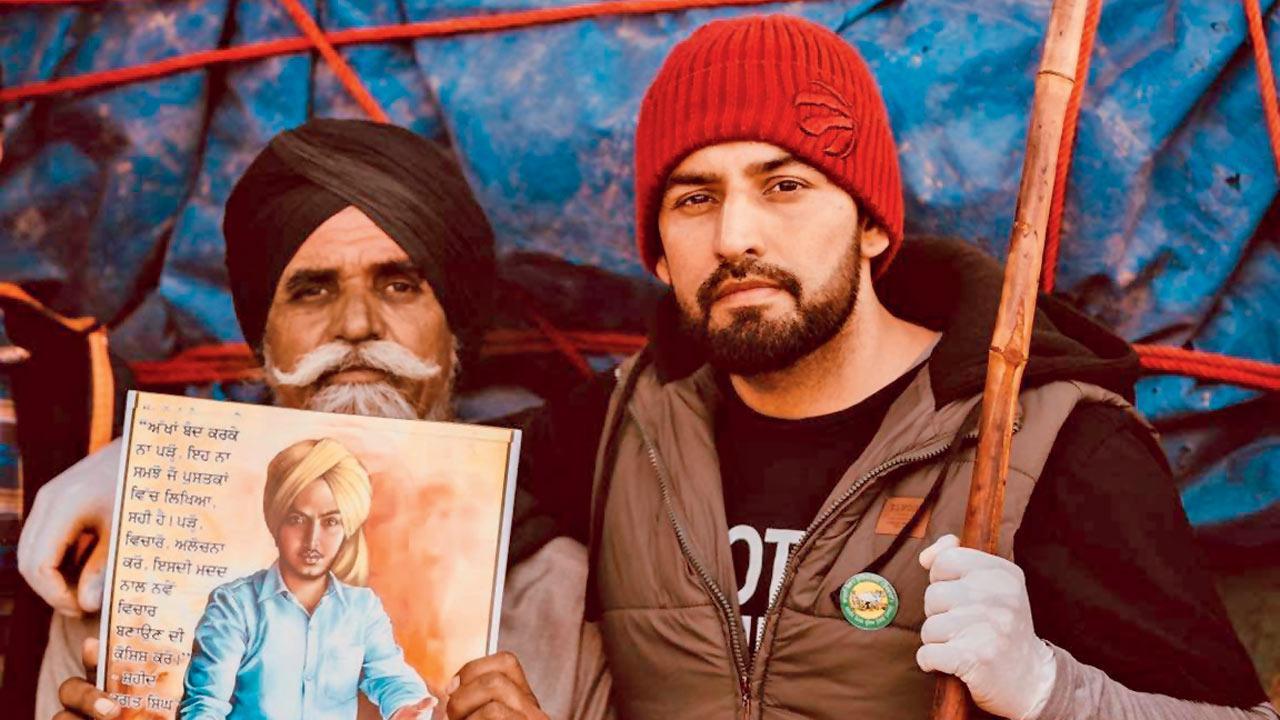An event this weekend will dissect the role that music plays in fanning the flames of the farmers' stir

Harf Cheema with a farmer
Anyone who thinks that the ongoing farmers' protest is a mere ripple in a pond, and not a tidal wave sweeping across the country, is being an ostrich with its head buried in the sand. It is one of the largest organised protests in Indian history, one that has jolted the central government into taking reconciliatory steps. What it's also done is spawn a whole host of songs that ignite the passions of the people who are braving an unforgiving winter while camping at sites along the border of the national capital. The lyrics are mainly in Punjabi and Haryanvi - which have become the lingua franca of the movement - and an event this weekend, called Songs of the Soil, will dissect the role they play in fanning the flames of this protest.
ADVERTISEMENT
Farmers protesting at the Singhu border in New Delhi. Pic/PTI
Music, in fact, has always been a natural byproduct of any such stir across the world, says Sudhanva Deshpande, a publisher and theatre person who is one of the organisers of the event. "My larger take on the issue of the arts and protests is that, I believe injustice can lull you and dull you; you might feel that it's endemic. People don't leave their homes and come out on the streets unless they believe that there is a chance to make a dent, that it's a battle they can win. And music strengthens that belief. It tells people that the injustice is not endemic," Deshpande says, adding that songs also help popularise the themes of a protest, apart from articulating its emotions.
Sudhanva Deshpande
With that in mind, this weekend's event will be separated into different sections where the focus will be on how the various songs serve individual purposes. There are some that exhort people to take up the cudgels, such as Ailan, which translates into 'declaration'. "But not all songs are about people rising up and smashing things. Some are really moving and beautiful. There is one that questions the meaning of the New Year, when these farmers are braving the winter, rain and the might of the state. And there is also the issue of language - the Haryanvi tunes might seem less musically accomplished than the Punjabi ones, but they have got more hits, which shows the role they are playing," Deshpande explains.
He adds that the event will also feature a conversation with Kanwar Grewal and Harf Cheema, two Punjabi musicians who have released a slew of songs centred on the protest that have received millions of hits on the Internet. They will talk about the issues that the farmers are bringing up, but what are these issues exactly? "There was no consultation when the bills were first presented. No one bothered to ask the farmers what they feel about the whole thing. And later, the government was deaf to their demands. But in what universe is it good if 500 organisations have come together and are willing to fight for their rights over a long period of time? These organisations are different in nature, but are united on one point - repeal these acts. Any dialogue can take place only after that," Deshpande says, pointing out that the wave of protest will only get bigger until a genuine olive branch is offered by the powers that be, to quell the tide.
On: January 9, 7 to 9 pm
Log on to: Studio Safdar on Facebook
 Subscribe today by clicking the link and stay updated with the latest news!" Click here!
Subscribe today by clicking the link and stay updated with the latest news!" Click here!







